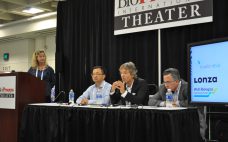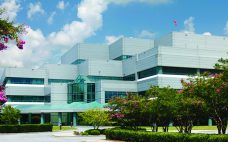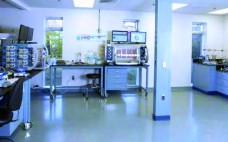In our modern biopharmaceutical industry, the maxim “bigger is always better” no longer applies. The industry’s modest virtual model persists in its popularity, emerging as a contemporary method of workplace efficiency. With an absence of manufacturing, virtual biopharmaceutical companies have found themselves unburdened by the multiple layers of bureaucracy that often plague large companies. With such freedom, they have operated much more efficiently in terms of time, resources, product specialization, and finances. As a result, virtual biopharmaceutical companies are growing…
Manufacturing
Outsourcing and Biomanufacturing Challenges for Emerging Therapies: A Roundtable Discussion at BIO 2016’s BPI Theater
The biopharmaceutical industry is increasingly interested in a range of emerging therapies. “We’re really starting to get beyond the monoclonal antibody,” said Patricia Seymour (senior consultant with BioProcess Technology Consultants) in her introduction to a lunchtime BPI Theater roundtable at the 2016 Biotechnology Industry Organization annual convention in San Francisco, CA, this past June. The discussion brought together three industry insiders for strategic outsourcing to talk about emerging biotherapies and their manufacturing challenges: Mark Angelino (senior vice president of pharmaceutical…
Managing Customer and Regulatory Expectations
Partnering with a contract development and manufacturing organization (CDMO) allows drug-product sponsors to turn fixed costs into variable costs. Market forecasting by pharmaceutical companies drives numerous decisions in development programs: sales-force resources, geographic resource distribution, and (of course) manufacturing planning. It is a widely accepted fact in the pharmaceutical industry that accurate forecasting is a challenge, especially for new drug launches. A number of models can be used to develop drug forecasts, but none of these models is perfect. No…
Outsourcing Trends in Biosimilars Development: A Discussion with Niall Dinwoodie (Charles River Laboratories)
No discussion about the future of the biopharmaceutical industry would be complete without assessing the impact of biosimilars. But such discussions no longer focus on whether biosimilars will enter the market, but rather when and how much market share will they take. The rapid progression of biosimilar candidates in company pipelines and the strong biosimilars research conducted by international organizations are strong indications that if your company is not already working within the biosimilars market, it may already be too…
Making the Correct Outsourcing Decisions: BPI Theater Panelists at BIO 2016 Discuss Current and Future Needs for Contract Services
Outsourcing has become a critical part of the industry in general and will play a larger role as companies continue to seek faster and more cost-effective routes to market. On Wednesday 8 June 2016, Gil Roth (president of the Pharma and Biopharma Outsourcing Association, PBOA) chaired a lunchtime roundtable titled “Making the Correct Outsourcing Decisions.” Roth’s association is a nonprofit trade group that represents CMOs and CDMOs through work with Congress and the FDA, with a focus on intra-industry issues.…
Harnessing the Power of Big Data to Improve Drug R&D
Like many other industries, biotechnology is being transformed by the emergence of big data — extremely large data sets that can be analyzed to reveal patterns, trends, and associations — and advanced analytics. Information from multiple sources such as electronic health records, payer claims, and mobile health platforms is growing exponentially. When used and harnessed properly, these data can boost the efficiency of drug research and development (R&D) in three critical areas: early R&D investment, drug development, and personalized medicine.…
Moving Toward a Continuous Future
During the March 2016 BPI West conference in Oakland, CA, BPI publisher Brian Caine and I had an opportunity to meet with Michael Egholm, PhD, Vice President and General manager of Biopharmaceuticals at Pall Life Sciences. We are pleased to be able to share his thoughts about Pall’s support of continuous processing — and the company’s current offerings. Montgomery: Not everyone seems to be defining continuous processing in the same way. What is your general concept of it? Egholm: At…
Enabling Continuous Processing Using a Step-by-Step Approach
Mario Philips is Vice President and General Manager of Single-Use Technologies at Pall Life Sciences. In February, he spoke with BPI publisher Brian Caine and editor in chief Anne Montgomery about Pall’s commitment to enabling continuous processing and its development of single-use technologies. In that discussion, he addressed some major process bottlenecks and Pall’s solution to them, including centrifuge replacements by continuous acoustic wave separation, continuous chromatography with multicolumn chromatography technology platform, and a simplified version of tangential-flow filtration. Read…
Bacteriophages, an Alternative to Antibiotics: Challenges and Possible Solutions for Bringing Them to Market
Bacteriophages are viruses (consisting of a genome contained within a protein coat) that specifically infect bacteria. They are the most abundant living entities on earth — the estimates range from 1030 to 1032 in total — and play key roles in regulating the microbial balance in every ecosystem where that has been explored (1). Bacteriophages are genotypic and phenotypically different from viruses that infect Archaea (Archaeovirus) and Eukarya (Eukaryovirus). The name bacteriovirus has been proposed as scientifically more accurate (2).…
Bridging Polymer Science and Biotechnology Applications with Single-Use Technologies
Implementation of single-use technology in the biotechnology industry is increasing every year. One major interest has been understanding the interaction of extractables with protein and cells for applications ranging from cell banking to biopharmaceutical manufacturing. In October 2015, the Engineering Conference International (ECI) organization hosted a conference in Leesburg, VA, to explore how the science of plastic applies to bioprocessing. The “Single-Use Technologies: Bridging Polymer Science to Biotechnology Applications” meeting brought together experts from different fields to share issues, understanding,…









